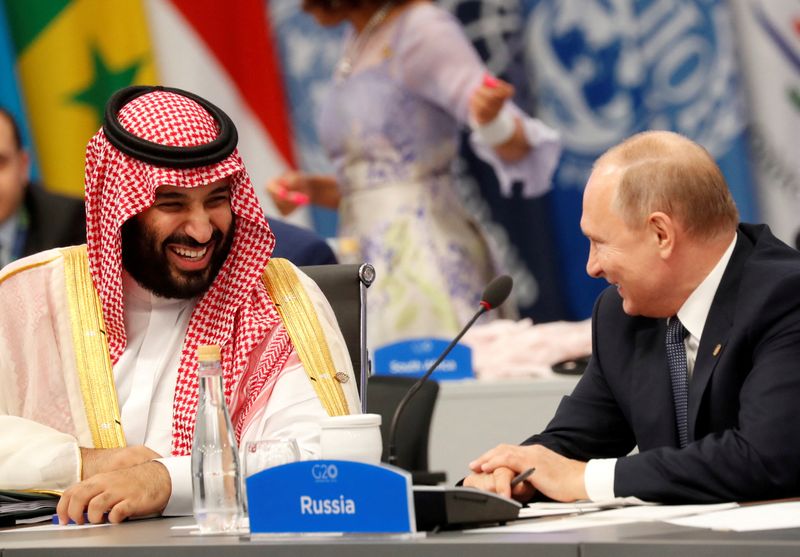By Aziz El Yaakoubi
RIYADH (Reuters) -Saudi Arabia has won a diplomatic victory by securing freedom for foreign fighters captured in Ukraine, signalling the value of the crown prince's alliance with Russia to Western partners seeking to isolate Moscow over the war there, analysts say.
Crown Prince Mohammed bin Salman may also find that the initiative -- intentionally or otherwise -- helps take him a step nearer international rehabilitation after the 2018 murder of Jamal Khashoggi damaged his reputation, they say.
With Prince Mohammed's mediation, Russia on Wednesday released 10 foreigners it had captured in Ukraine, including five Britons and two Americans.
The move, apparently made possible by Prince Mohammed's carefully nurtured ties with Russian President Vladimir Putin, coincided with a prisoner exchange involving 215 Ukrainians and 55 Russians and pro-Moscow Ukrainians that Turkey helped broker.
Kristian Ulrichsen, a political scientist at Rice University's Baker Institute in the United States, said the working relationship between Saudi Arabia and Russia appears to have been a crucial element in the choice of intermediary.
"By sanctioning this mediation and delivering results, Mohammed bin Salman is able to present himself as capable of playing the role of regional statesman in a way that counters the narrative of the crown prince as an impulsive and disruptive actor," Ulrichsen said.
Prince Mohammed's initial image as a bold reformer was battered by the 2018 murder of Khashoggi, a Washington Post columnist, at the hands of Saudi agents seen as close to MbS.
He denies ordering Khashoggi's killing while saying he ultimately bore responsibility as it happened under his watch.
'HUMANITARIAN GESTURE'
In remarks to the BBC, Saudi Foreign Minister Prince Faisal bin Farhan said the motivation behind Saudi Arabia's involvement in the prisoner release was humanitarian. He denied the Crown Prince had become involved to rehabilitate his reputation.
"That didn't factor into it. I think that's a very cynical view," he said. He added that on the conflict itself, the kingdom wanted to see a negotiated solution and Riyadh was committed to trying to help secure that outcome.
Prince Faisal said the crown prince had engaged with Putin to work out a prisoner deal since April, when he "understood" the issue of the five British citizens following a visit to the kingdom by then British Prime Minister Boris Johnson.
"His Royal Highness was able to convince President Putin that this is a humanitarian gesture that is worthwhile, and this is how we achieved this result," Prince Faisal told Fox News.
The freed prisoners, who also included a Croatian, a Moroccan, and a Swedish national, were flown to Riyadh on a Saudi plane where officials lined up to greet them.
U.S. citizens Alexander Drueke, 39, and Andy Huynh, 27, both from Alabama, are expected to leave Saudi Arabia within days, officials said.
The importance of the kingdom, the world's largest oil exporter, to both Washington and Moscow has grown at a time when Russia's war in Ukraine is roiling global energy markets.
World leaders have beat a path to Riyadh to ask for more oil production. But Saudi Arabia has shown little readiness to join the effort to isolate Russia. It has stepped up its cooperation with Putin, including within the OPEC+ oil producers group.
'USEFUL' TIES TO RUSSIA
A visit in July by U.S. President Joe Biden failed to secure commitments from the Saudis for an immediate oil output rise or a harsher stance against Putin, highlighting the tensions weighing on the relationship between Washington and Riyadh.
Ali Shihabi, a pro-government commentator, said the Saudi mediation in the prisoners' release "was a first".
"I think the kingdom was messaging the West that its ties to Russia can also serve a useful purpose for them," said Shihabi.
"You need some countries to maintain ties to both sides."
A Western diplomat said the prisoners' deal had been months in the making, but most of the diplomatic community in the Gulf heard about it only at the very last stage.
U.S. National Security Adviser Jake Sullivan, Secretary of State Antony Blinken and British Prime Minister Liz Truss thanked the Saudi crown prince for his role.

Kristin Diwan, senior resident scholar at the Arab Gulf States Institute in Washington, said it was unusual for Saudi Arabia to deploy the strategy of diplomatic brokerage -- something well established for smaller Gulf states such as Qatar to leverage their ties.
"It's like alchemy - he (Prince Mohammed) is turning his much-criticized ties with Russia into gold," Diwan said.